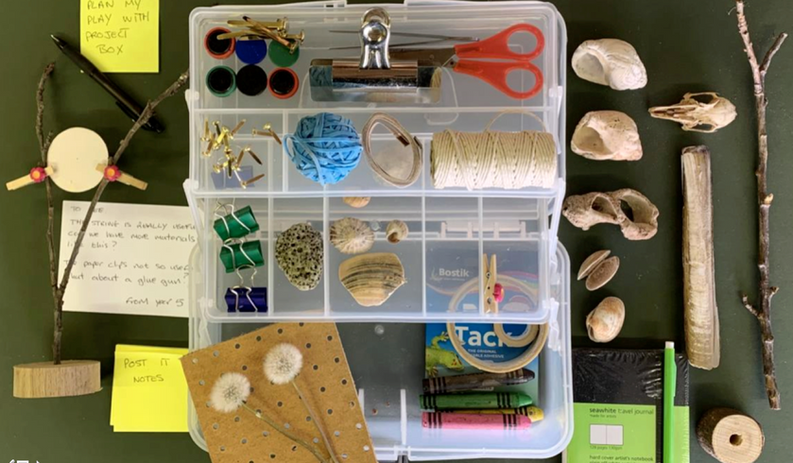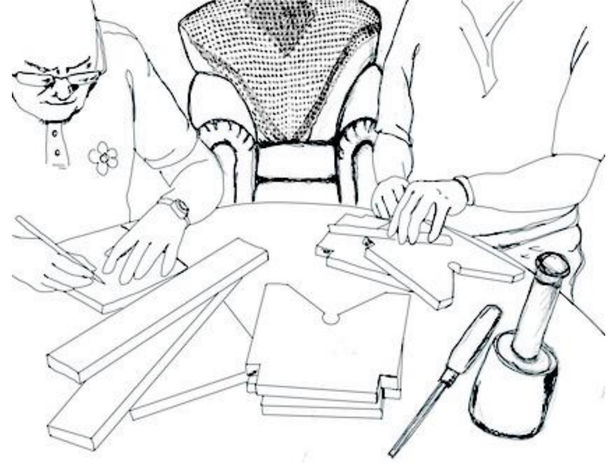Case Studies and Research
Fuse

One of the insidious effects on communities experiencing structural barriers to success is that there can be a lack of confidence to explore, discover, plan and fail. ‘Small horizons’, reduced aspirations and a propensity to settle for less are the inevitable outcome. FUSE is a cross-disciplinary project that aims to open up horizons of discovery for primary school children from these seldom heard from communities.
FUSE builds upon a project rooted in the depths of the first COVID-19 lockdown when we were all confined to our homes. The pandemic challenged many families as they reorganized established routines of working, learning and living together. But for those on who we all depended, who cared for the elderly, cleaned hospitals, kept stores stocked with food and other essential goods, and maintained power, water and communication systems, the balancing of work, home and childcare was far more difficult. And for vulnerable populations with precarious incomes, insecure food supplies and little or no access to green space, the impact on well-being was more marked. This resulted in many parents faced with home schooling, stressful for everyone but a significant portion of these parents did not themselves have a strong educational base to draw from and also lacked the digital and physical resources to provide a stimulating environment to support their children. If ever there was a context to widen the educational gap between the have and have-nots, this was the perfect storm.
The Box Project responded to this, not by parachuting in technology but rather developing a high-quality set of physical resources pens, paper, googly eyes, balloons and many others in a robust and good quality cantilever tool box. It set itself a stiff set of evaluation criteria. The boxes needed to support children stilled by lockdown in returning to their former thinking, moving, creative selves. They needed to reawaken learning in children whose worlds had shrunk and whose opportunities for growth had seized up. They needed to excite the imagination, leave space for collaboration and foster the focused engagement that correlates with intellectual development. There could be no cookie cutter outcomes. For the boxes to meet these criteria for children of multiple age groups and living in a diversity home environments, the boxes had to offer multiple pathways to success. Throughout lockdown these box resources have been adapted and replenished. To accompany the boxes a range of research-led provocations and suggestions (not worksheets) were designed. A collaborative outcome of the efforts of the FUSE team, David Perez and Nuri Kwon, Joe Bourne, school administrators and educational consultants, and academics from across the university, the boxes were taken up differently in each school. However, the overarching result was the same. In almost every setting, Heads described both immediate and longitudinal effects of integrating the boxes into their pandemic responses.
Working closely with the schools in Morecambe and Lancaster and lead by Nik Marsdin the Universities Schools development manager, the Box Project has to-date distributed over 2,000 boxes.
Teachers are responding to the boxes and the changes seen in their children and as researchers we are seeing changes in practices in schools. For example, Stepping Stones, which works with students with significant learning challenges, uses the boxes as a mediational resource in fostering students’ capacities for self-management, thus hastening their reintegration into a mainstream classroom. Over time, teachers have seen resources from the boxes appear in school projects, extending what children have been supported in imagining and exploring. Regardless of how it has been taken up, the Box becomes a box of ideas.
Box though was never just about physical resources but rather unlocking and unlocking the potential of children and the teachers of those whose possibilities are confined by institutional regimens and who do not benefit from the privileges offered (for example) to those working in academia. FUSE has grown out of this aspiration to stimulate a more equitable landscape for children and their teachers. We are exploring with them how to embed discovery, co-design, collaboration and the confidence to fail. Collaborating together across Linguistics (Diane Potts) School Engagement (Nick Marsdin) and Design (Leon Cruickshank and Lee Brewster) FUSE aims to transform teaching and learning through a co-design approach to discovery in primary children and teaching.
Research Team
Lee Brewster, Leon Cruickshank, Diane Potts Violet Owen and Nick Marsdin.
Project in a Box





‘Project in a Box’ is a collaboration for our times, an example of how researchers, university outreach staff and schools can come together quickly to address the systemic inequalities in education exacerbated by the Covid-19 pandemic. Invited into the project by Lancaster University’s engagement team, ImaginationLancaster`s Community and Public Sector cluster has both facilitated the development and contributed to a resource designed to engage and connect young people who find themselves isolated at home by the pandemic.
What is the Box? It is fun and playful. It’s string and stickers and chopsticks and blue-tack: the Box is Imagination’s involvement in physical form. An array of materials and tools support open-ended exploration and creativity, which is a way of looking at the world that local schools worry is being suffocated by current circumstances. The Box is more than the physical resources, however. In consultation with schools and with educators involved in the development of the Morecambe Bay Curriculum, Imagination Lancaster and Dr. Diane Potts from the Linguistics Department designed ‘prompt’ posters that accompany the Box and which further encourage exploration. The ‘prompt’ posters orient children to 4 different ways of thinking about what they’re doing; explore, build, tell, and test.
Children’s connections with their school, with their community and with each other are also central to the design. ‘Project in a Box’ encourages young people to share their creative activity by making videos, sending postcards and taking photos, in-fact they can show their creations however they choose. The results of their playful activity will be shared with their teachers in school and with their friends and families providing new connections and strengthening existing ones.
The children will become part of the design team as the project moves forward. They will co-design the future materials, tools and prompt posters with teachers and academics. The initial posters were generated from ideas gathered from a number of faculties and areas of research across the University.
As well as being part of the co-design team the children and teachers of schools in the area including Morecambe Bay and Ryelands will be contributing to some exciting research being carried out by Imagination Lancaster and the University’s Linguistics faculty that focuses on community engagement and connecting children.
This is also contributing to our research in Imagination, understanding the way the boxes and prompt posters are used will help us create more effective, fun and productive ways of engaging with children nationally and internationally.
For more information on Co-Designing Discovery
Research Team
Lee Brewster, Leon Cruickshank, Diane Potts, David Pérez, Nik Marsdin and Nuri Kwon.

Dovetails

Exploring ways creativity can build connections in our community through hands-on learning, making, and giving.
Dovetails was an intergenerational making project with Beamish Museum's health and wellbeing team through their men's group and KidsKabin, a community based children's charity in Newcastle. Objects were designed and made by each group during a 10 week workshop phase and gifted to the other group at a special celebratory event at the end of the project which was held at Beamish Museum. Throughout the project each group made a short video to communicate their ideas and prototypes to the other group.
'FlexiGames' a modular kit of parts for creative play was made for KidsKabin by Beamish Men's Group members: William, Alan, Brian, and Ray.
Tambour Door Tool Cabinet was made for KidsKabin, by Beamish Men's Group members: Les, Fred, and Joe.
'Our Lucky Shelves' for the Men's Group's shed was made by Lucky from KidsKabin.
A Carved Garden Bench was made for the Men's Group's garden, by over 10 KidsKabin members.
Dovetails is part of the Ageless Citizen Project at Northumbria University and wthin the wider UKRI funded Centre for Digital Citizens.
For more information on Dovetails
Research Team
Henry Collingham, Jayne Wallace, Jill Brewster, Rickard Whittingham and Sebastian Prost.
Well Crafted

This Practice-based research explored participatory handcrafting for people living with dementia at Beamish Open-Air Museum - The Living Museum of the North (UK)
The Research addresses the difficulty for people living with dementia to maintain meaningful roles in the community after diagnosis. It considers the role of participatory handcrafting as a strategy for promoting wellbeing and independence for people living with early stage dementia. The setting for the making activity was Orchard Cottage within the 1940's themed Home Farm area at Beamish Museum. The immersive nature of the venue was a natural conversation starter, the artefacts in the themed living room prompted people to make connections with each other, to personal histories and to the local domestic and industrial heritage of the region.
The study explored the potential of a social enterprise workshop model by making handcrafted products to sell in the museum gift shop that challenges the assumption that a diagnosis of dementia is a barrier to participation and learning new skills. Whilst craft and reminiscence activities have been a long standing part of the wellbeing offer at Beamish Museum for people living with dementia, this was a different kind of engagement where people were active partners and helped build a community of makers, becoming owners of the initiative alongside design researchers. A Dementia Friendly Design Team was established that aimed to empower the person living with dementia by including them as equal contributors in a design process and as a valued member in a team of co-workers.
The commercialisation of their handmade products contributed financially to the sustainability of the project, with profits from the sales used to fund new activities in the Health and Wellbeing Team.
For more information about the project with the Health and Wellbeing Team at Beamish
Research Team
Jill Brewster, Colin Wilson, Jayne Wallace and Justin Marshall, School of Design, Northumbria University
Michelle Kindleysides at Beamish Museum








































